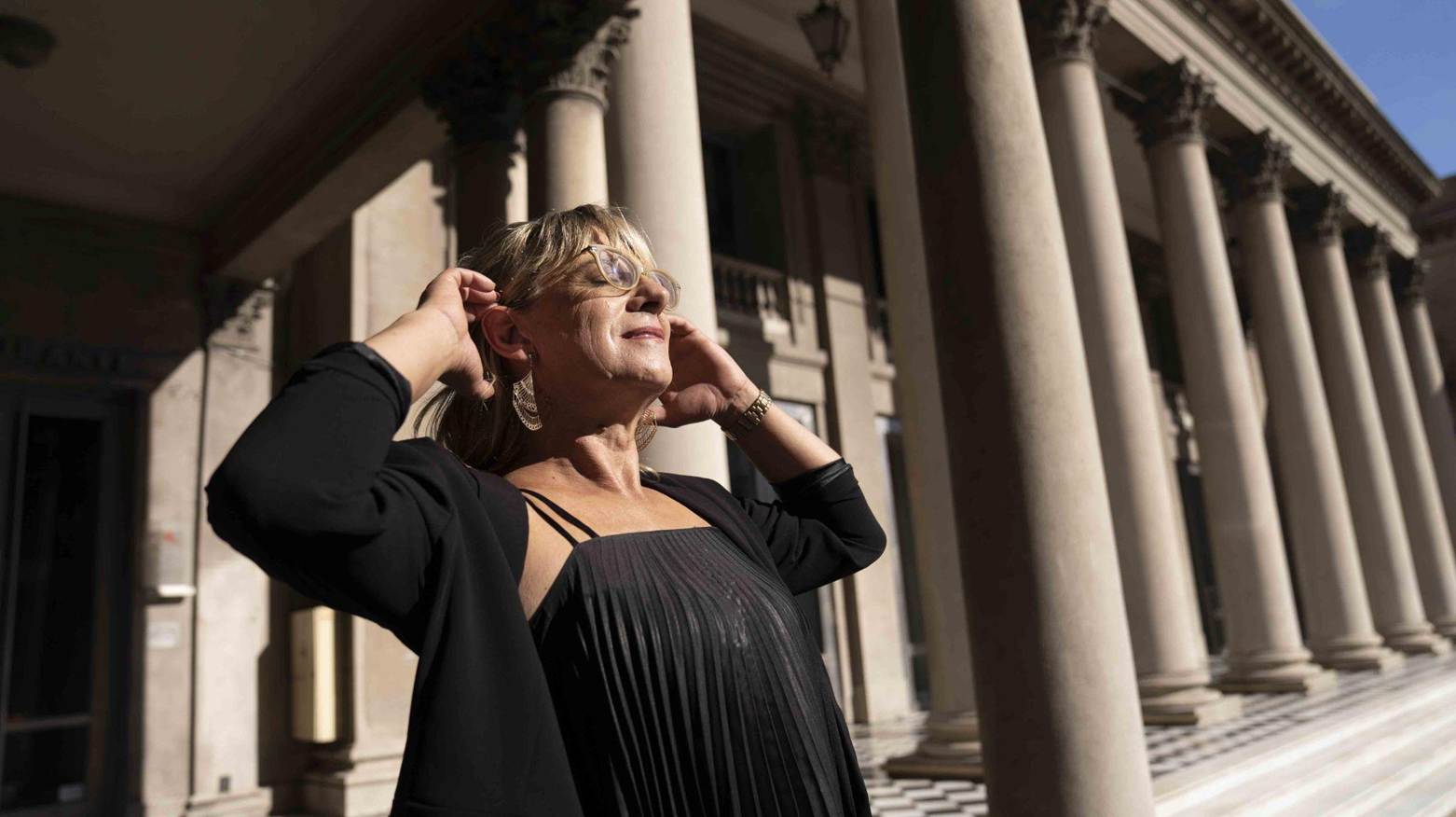Collette Spinetti: Conquering New Frontiers for the Next Generation of Uruguayan Trans Women

In 2024, amid a surge of conservative governments throughout the region, Uruguay's Frente Amplio-led presidency, under the direction of Yamandú Orsi, appointed Collette Spinetti as Human Rights Secretary. Orsi's election was celebrated by progressive sectors in South America, especially after similar victories by center-left leaders in Colombia and Brazil. Spinetti, a trans activist and literature professor, made history as the first trans woman to hold such a position in Uruguay. This article is based on an interview with Collette that took place in August 2025. In the interview, she talked about her background and shared her thoughts on the current situation for trans individuals in South America.

"When I imagined myself in the future, I imagined myself as a woman. I imagined myself with Prince Charming, living happily ever after," Collette says at the start of our conversation. Her earliest memories are sweet and always accompanied by a loving family. She studied folk and classical dance during her childhood and adolescence, and her flourishing imagination led her to believe that two cans tied with jute twine could be high heels. This fantasy world became more real when Collette read Leaf Storm by Gabriel García Márquez in her youth. "García Márquez is responsible for who I am. I read him for the first time during the summer, and that's when I fell in love with literature and decided to become a literature professor." It wasn't an easy decision: "I always knew about my gender identity, but at that time, I couldn't express it. Social media and cellphones didn't exist. I felt like I was the only one with these feelings." On her first day of college, Collette wore masculine clothes styled to look feminine. "I wore a delicate shirt and baggy jeans. But one of the professors said to me, 'With those kinds of clothes, you can go to the boulevard—a red-light district for travestis—but not here.'"
Collette has a very good memory, she remembers with several details each moment across her life. When I asked her about the first time teaching Literature, she recalled the hard times in the Uruguayan context: “I started to work in 1988. At that time, the laws against trans people were still in force, and the police detained us for wearing clothes of the opposite sex. I always said that I was a travesti at that time because I perceived myself as a woman, but I had to dress like a man in my job. I had to sacrifice my gender identity to get a job. Each day when I got back to my home, I returned to my woman’s clothes and put on makeup.” Many of these memories are also portrayed in a lovely letter that Collette published in the book Cartas para Abrazar, a compilation of women's letters telling their life experiences.
“I always was a dreamer, but I suffered from that. Being a dreamer, living and thinking about an ideal world, was costly for me. For example, I had to resign from dancing because my dance style was judged as very feminine, and at that time, or even today, dance is very strict about gender roles. I also suffered work abuse. I had many problems with my employers because even when I had already transitioned, they still treated me as a man in front of my students.” Despite this violence, Collette’s dreams brought her to the most important position ever held by a trans woman in the Uruguayan executive government. “That dreamer also conquered important things and was a pioneer. Beyond the vanity, I would love that more trans girls have the same opportunity as me. I was the first trans professor in Uruguay, and I was the first School principal too.” Collette always recalls her own victories as a goal for other trans women in the future. In her book she wrote: “The denied place is the place you will conquer for those who will come.” This phrase sounds like a mantra throughout our conversation.
Her designation as Human Rights Secretary is not free of controversies. The victory of Yamandu Orsi and Frente Amplio was tight; they only achieved 52% of votes, against the republican candidate with 48%. That suggests a complex political context, with Uruguayan society mostly divided. Since March 2025, Collette has been working in this new role, always under public scrutiny, especially among conservatives. Uruguay is not exempt from the false dichotomy developed by the anti-woke sector that pits gender-inclusive policies against policies that solve the drugs, health, and economic problems of "good" citizens. Some of the initiatives Collette has championed were taken jokingly in the press, like a drag queen show in an official building or her recent proposal to erect a monument dedicated to travesti sex workers on Artigas Boulevard, a historical red-light district.
"My role carries significant responsibility," stated Collete Spinetti. "In our society, the entire LGBTQ+ community will be judged by my performance. Furthermore, it's a great responsibility to hold the President's trust, especially following the false accusations made against him during the campaign." Orsi was falsely accused of assaulting a trans woman during the campaign, making Collette's appointment a strategic move by the new government to counter the right-wing narrative against Frente Amplio. "However, I believe I possess the necessary capacity for this position. My selection wasn't solely based on my being trans. This government isn't built on the identities of its members—whether they are Afro-descendant or marginalized—rather, everyone has developed the skills and background to defend the best interests of the people."
Despite the critiques, controversies, and jokes, Collette is developing a significant body of work, especially considering the challenging circumstances in the region. Historically, Argentina was a leading LGBT-friendly nation in South America. However, Uruguay has recently taken on that role. Recent legislative changes, community organization involvement, and Collette's undeniable influence within the government are collectively transforming the landscape for the trans community.

"In the region, we still have many rights to fight for, even though our rights are recognized in some countries, such as Uruguay, Argentina, Chile, Costa Rica, Mexico, and Cuba. However, in most other countries, our rights are not yet legally recognized. This means that we still face huge challenges to move forward and to simply exist. We, the members of the LGBTIQ+ community, want to be ourselves and enjoy our human rights. That is all we are asking for. Obviously, we need legal frameworks to ensure respect for our rights and combat discrimination and violence. Brazil is still one of the countries with the highest rate of trans murders. This intersectionality occurs throughout Latin America and the Caribbean among movements that promote hate speech and ultra-religious and conservative movements. These movements are linked to the right-wing political power that opposes human rights. We saw an example of this in Brazil when Bolsonaro took office. The first thing he did was visit a neo-Pentecostal church to receive its blessing. Many of his ministers were priests from these churches. This is now being repeated in other Latin American countries," Collette declared about the current regional situation.
Her smile is always fresh and bright. She is aware of her central role and is embracing it with the same enthusiasm with which the young Collette wore her precarious high heels. She is navigating a complex wave of tensions and threats against the trans community by offering clear answers and smart projects. She is building alliances with other government sectors to provide an intersectional perspective on her policies. Furthermore, Collette is publicly demanding a new role for trans people as participants in political decisions and the profound transformations of Uruguayan society. The times ahead may be negative and dark, but the precedents Collette has established raise the bar for future generations while simultaneously paving a path that was once full of obstacles. In Cartas para Abrazar, Collette wrote a letter to her younger self. Now, she is writing a letter to future generations, giving them the power and hope to dream of a utopian world without borders or differences.
References
Corte Electoral Republica Oriental del Uruguay. (n.d.). Resultados de escrutino departmental todo el país. https://eleccionesnacionales2024.corteelectoral.gub.uy/
Editorial Team. (2025, September 17). National disgrace: The Presidency hired drag queens for the event: 19 new diversity offices were announced across the country. La Derecha Diario. https://derechadiario.com.ar/us/uruguay/national-embarrassment-presidency-contracts-drag-queens-for-event
Fox, M. (2025, March 3). Stories of resistance: Standing for trans rights in Uruguay. The Real News. https://therealnews.com/in-uruguay-a-pathbreaking-trans-activist-is-now-a-government-minister
García Márquez, G. (1972). Leaf storm and other stories. New York, Harper & Row. https://archive.org/details/leafstormotherst0000garc
Little, J. [j450n_l]. (2018, December 12). I'm the first person in the world with a neural-enabled prosthetic hand. Using an specialized prosthetic and a device implanted [Online forum post]. Reddit. https://www.reddit.com/r/AMA/comments/a5jxbe/im_the_first_person_in_the_world_with_a/
Museo Nacional de Artes Visuales. (2023, March 21). Presentación del libro: Cartas para abrazar. https://mnav.gub.uy/cms.php?id=cartasparaabrazar
Transgender Europe. (2024, November 13). Will the cycle of violence ever end? TGEU’s Trans Murder Monitoring project crosses 5,000 cases. Transgender Europe. https://tgeu.org/will-the-cycle-of-violence-ever-end-tgeus-trans-murder-monitoring-project-crosses-5000-cases/
Uruguay: National Party leader arrested for fabricating assault claims against candidate Orsi. (2024, May 6). MercoPress. https://en.mercopress.com/2024/05/06/uruguay-national-party-leader-arrested-for-fabricating-assault-claims-against-candidate-orsi
[urymasa1970]. (2025, October 4). Colette Spinetti when she proposed a sculpture in tribute to the trans prostitutes of Bulevar Artigas. Reddit. https:www.reddit.com/r/monte_video/comments/1nuwfdl/colette_spinetti_cuando_propuso_una_escultura_en/?tl=en
